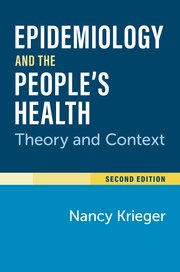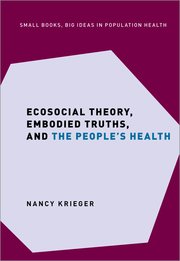Krieger Research Group
Welcome to the website of Nancy Krieger, PhD, an internationally renowned social epidemiologist.
677 Huntington Avenue
Kresge Building 7th Floor
Boston, Massachusetts
02115
Epidemiology and The People’s Health
Theory, etiologic research, and methodologic research to advance health justice
Dr. Krieger’s work addresses three topics: (1) conceptual frameworks to understand, analyze, and improve the people’s health, including the ecosocial theory of disease distribution she first proposed in 1994 and its focus on embodiment and equity; (2) etiologic research on societal determinants of population health and health inequities; and (3) methodologic research on improving monitoring of health inequities.
Advancing health justice: from developing to applying the ecosocial theory of disease distribution
In 1994, Dr. Krieger published the now classic article “Epidemiology and the web of causation: has anyone seen the spider?,” in which she first proposed her ecosocial theory of disease distribution, which analyzes how and why people embody, i.e., literally biologically incorporate, their societal and ecologic context, thereby producing population patterns of health and health inequities.
Also in 1994, Dr. Krieger co-founded, and still chairs, the Spirit of 1848 Caucus, affiliated with the American Public Health Association (APHA). The Spirit of 1848 is concerned with the links between social justice and public health and, in addition to organizing highly-attended sessions each year at APHA, hosts an influential listserv with global reach.
Dr. Krieger’s work developing and applying ecosocial theory has continued to expand, via: (1) empirical research; (2) a new series on “small books, big ideas for population health” published by Oxford University Press; (3) development of freely available resources to improve monitoring of and action to address health inequities, via the Public Health Disparities Geocoding Project, and (4) the continued growth and reach of the Spirit of 1848 Caucus.
Dr. Krieger’s books and book series advancing epidemiology for the people’s health

In April 2011, Dr. Krieger’s pathbreaking book, Epidemiology and the People’s Health: Theory and Context, was published by Oxford University Press; in 2024, she published its thoroughly revised and updated second edition. This book presents the argument for why epidemiologic theory matters. Tracing the history and contours of diverse epidemiologic theories of disease distribution from ancient societies on through the development of — and debates within — contemporary epidemiology worldwide, it considers their implications for improving population health and promoting health equity.

In 2018, Dr. Krieger launched a new book series for Oxford University Press on “small books, big ideas in population health.” Topics addressed include: “Political Sociology and the People’s Health” (Beckfield, 2018); “Climate Change and the People’s Health” (Friel, 2019); “Critical Epidemiology and The People’s Health” (Breilh, 2021); “Ecosocial Theory, Embodied Truths, and The People’s Health” (Krieger, 2021); “Causal Inference and the People’s Health” (Schwartz & Prins, 2025) – and more are in production: stay tuned!
Dr. Krieger is also editor of Embodying Inequality: Epidemiologic Perspectives (Baywood Press, 2004) and co-editor, with Glen Margo, of AIDS: The Politics of Survival (Baywood Publishers, 1994), and, with Elizabeth Fee, of Women’s Health, Politics, and Power: Essays on Sex/Gender, Medicine, and Public Health (Baywood Publishers, 1994).
Developing freely accessible resources to improve monitoring and analysis of the people’s health, to guide action for health justice
At this website, you can find the following freely accessible resources:
- Experiences of Discrimination (EOD) instrument to measure self-reported experiences of discrimination
- The Public Health Disparities Geocoding Project: (a) original 2004 monograph, (b) 2020 COVID-19 update and resources, and (c) the 2022 Public Health Disparities Geocoding Project Training 2.0 update
- The COVID-19 & Health Justice Resource page (co-produced by the Spirit of 1848 Caucus and Public Health Awakened);
- Data Sharing Resources for Dr. Krieger’s empirical research;
- 1998 Breast Cancer Core Questionnaire (US National Action Plan on Breast Cancer), including the module on “Sociodemographic and Cultural Factors”
- Webcasts and related on-line presentations by Dr. Krieger;
- Information on the Interdisciplinary Concentration for Women, Gender, and Health (chaired and co-founded by Dr. Krieger) and its many resources;
- Links to the Spirit of 1848 website, including instructions on how to join the listserv.
Women, Gender, and Health Concentration
In 1996, Dr. Krieger co-founded, and now chairs, the Interdisciplinary Concentration on Women, Gender and Health (WGH) and its WGH Working Group, based at the Harvard T.H. Chan School of Public Health, and teaches its advanced seminar on “Embodying Gender: Public Health, Biology, and The Body Politic” (WGH 250).
Spirit of 1848 Caucus, affiliated with the American Public Health Association
The Spirit of 1848 is, as we state at our website, “a network of people concerned about social inequalities in health. Our purpose is to spur new connections among the many of us involved in different areas of public health, who are working on diverse public health issues (whether as researchers, practitioners, teachers, activists, or all of the above), and live scattered across diverse regions of the United States and other countries. In doing so, we hope to help counter the fragmentation that many of us face: within and between disciplines, within and between work on particular diseases or health problems, and within and between different organizations geared to specific issues or social groups. By making connections, we can overcome some of the isolation that we feel and find others with whom we can develop our thoughts, strategize, and enhance efforts to eliminate social inequalities in health.”

At our website you will find information about the sessions we organize at the American Public Health Association (including yearly reportbacks, posted since 1994, available via the “APHA activities” tab) and instructions on how to join our Spirit of 1848 listserv, which posts information (often on a daily basis) regarding links between social justice and public health.
Academic profile
Research
Currently active projects include:
(NIH/NIMHD: 1R01MD012793-01A1; PI = Krieger)
This study seeks to advance methods to measure and analyze multiple types of discrimination for population health research by comparing novel implicit vs. conventional explicit measures of exposure to investigate different approaches to modeling exposure to multiple types of discrimination. Types of discrimination being addressed include discrimination based on: race/ethnicity (racism), sex/gender (sexism), sexual orientation (heterosexism), gender identity (gender binarism), age (ageism), and weight (fattism).
(NIH/NIMHD: 1R01MD014304-01; PI = Krieger)
This project is investigating how DNA methylation varies with exposure to racial discrimination, economic hardship, and air pollution, and how these changes may contribute to racial/ethnic and economic disparities in cardiometabolic disease risk and accelerated aging. The primary study population are participants in the My Body, My Story (MBMS) study (previous study led by Krieger, based on a random sample of members of 4 Boston community health center); the replication dataset is derived from MESA (Multi-Ethnic Study of Atherosclerosis).
(NIH/NICHD: 1R01HD092580-01A1; PI = Waller/Emory)
Recent years have seen a rise in the use of small sample-based estimates and with much higher margins of error than in past studies. Our research program will develop novel statistical approaches to measure and adjust for these sources of local variability allowing increased accuracy and reliability in small area estimates of health risks. Analyses are also investigating the potential impact of the new US Census Bureau methodology of differential privacy (starting with the 2020 decennial census) on small area statistics.
Two 5-year series of investigations (2015-2020; 2020-2025), carried out under the auspices of the American Cancer Society Clinical Research Professorship awarded to Dr. Krieger. The initial foci were on: (1) “Social inequalities in breast cancer estrogen receptor status: over time, across countries”; (2) “Methods to improve measuring and monitoring of cancer inequities”; and (3) “Methods to improve measures of adverse discrimination, relevant for cancer research.” Subsequent foci include: (1) conceptual work on cancer inequities & emergent embodied phenotypes, as reflected in: (a) Dr. Krieger’s 2021 book “Ecosocial Theory, Embodied Truths, and The People’s Health”, and (b) the 2024 2nd edition of Dr. Krieger’s book Epidemiology and The People’s Health: Theory and Context, and (2) new work on cancer and climate change.
Recently completed projects have included investigating the impact of historical redlining on: (a) cancer stage at diagnosis in Massachusetts and (b) risk of preterm birth in New York City.
Publications
Support Harvard Chan School
Every gift contributes to our mission of building a world where everyone can thrive. To learn more about how you can support Krieger Research Group, please contact Meg Matthews at mmatthews@hsph.harvard.edu